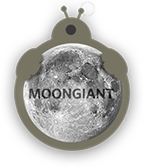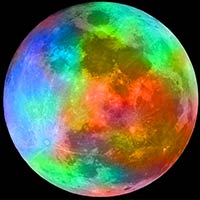
 February 18 Waning Crescent 4% |
 February 19 Waning Crescent 1% |
 New Moon Illumination: 0% |
 February 21 Waxing Crescent 3% |
 February 22 Waxing Crescent 8% |
Moon Phase: February 20, 2023
On this day the Moon was in a New Moon phase. During this phase the Moon is too close to the sun in the sky to be visible. The moon rises and sets with the sun and is not present in the night sky. Because of this the night sky is darker and an excellent time to view other celestial objects. Like the Full Moon, a New Moon happens at a very specific time when the sun and moon have the same ecliptic longitude and it can be measured down to the second it occurs.
Visit the February 2023 Moon Phases Calendar to see all the daily moon phase for this month.
New Moon Phase
The New Moon on February 20 has an illumination of 0%. This is the percentage of the Moon illuminated by the Sun. The illumination is constantly changing and can vary up to 10% a day. On February 20 the Moon is 0.47 days old. This refers to how many days it has been since the last New Moon. It takes 29.53 days for the Moon to orbit the Earth and go through the lunar cycle of all 8 Moon phases.
Today's Moon Sign: ♒ Aquarius
The current zodiac moon sign is Aquarius, positioned at 2.16° within the sign. The Moon entered Aquarius on Loading... and will shift into Pisces on Loading.... The zodiac moon sign represents the position of the Moon as it moves through the twelve signs of the zodiac. Each zodiac moon sign lasts about 2 to 2.5 days as the Moon travels through that part of the sky.
The 8 Lunar Phases
There are 8 lunar phases the Moon goes through in its 29.53 days lunar cycle. The 4 major Moon phases are Full Moon, New Moon, First Quarter and Last Quarter. Between these major phases, there are 4 minor ones: the Waxing Crescent, Waxing Gibbous, Waning Gibbous and Waning Crescent. For more info on the Moon Cycle and on each phase check out Wikipedia Lunar Phase page.
Phase Details for - February 20
Illumination: 0%
Moon Age: 0.47 days
Moon Angle: 0.54
Moon Distance: 366,202.73 km
Sun Angle: 0.54
Sun Distance: 147,941,219.98 km
Useful Moon Resources
Check the weather before a night of Moon gazing at weather.com
For a list of all the current meteor showers visit American Meteor Society
New Moon Moonrise and Moonset


